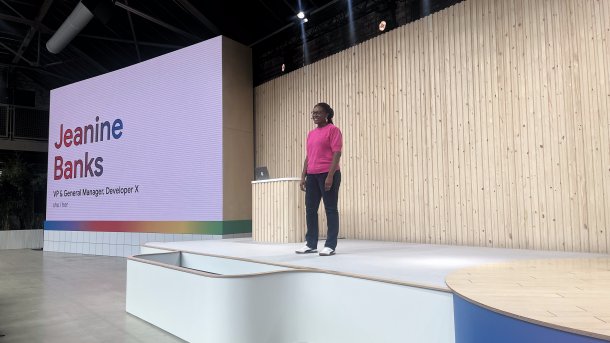Google I/O Connect in Berlin: Gemma 2 and a tight program
Google has brought I/O to Berlin. Gemma 2 was presented there. Developers can look forward to a program of sessions and workshops.

Jeanine Banks on stage at I/O Connect in Berlin.
(Image: emw / heise online)
Google's in-house trade fair I/O is actually only held once a year and, of course, at the main location in the USA. But to bring the event closer to the people, it has been expanded to include I/O Connect, as Tim Messerschmidt, Head of Developer EMEA, says. A second trade fair, which is taking place for the second time this year. After Amsterdam 2023, 1300 developers from Europe, the Middle East and Africa came together in Berlin. Among other things, Gemma 2, Google's open source model, was presented.
Messerschmidt was invited to give the opening keynote. The news, however, will be brought by Jeanine Banks. She is Vice President and General Manager for Developer X and Head of Developer Relations at Google - and the same person who holds the developer keynote at the big I/O. In Berlin, Banks presented Gemma 2, which is now available worldwide for developers and scientists. The open model is available with 9 and 27 billion parameters. Gemma 2 is said to be significantly more efficient than its predecessor and more secure. According to Google, the large version with 27B parameters beats other models twice as large in terms of overall performance. Gemma 2 runs on Nvidia H100 Tensor Core GPUs and TPUs, which should noticeably reduce costs.
Videos by heise
The ideas also include, for example, making Console Insights available worldwide. This allows users to identify and resolve problems directly in the browser console - with the help of AI. This, as well as some other small developer features, will be presented in live demos on the I/O stage. Banks, for example, will show how soccer rules can be explained using a sketch in Google Studio AI and how code can be generated from this and the development processes continue to run.
AI trumps mobile, web and cloud
Wieland Holfelder, Vice President Engeneering and Site Lead for Google Cloud in Germany, talks about how he completed his PhD in Silicon Valley in 1993. Back then, nobody knew what the web would become, but everyone did. Something big had happened. Now, with AI, it's the same situation again: something big is happening. Holfelder also speaks on stage with Christina Decker, Head of Digital and Innovation Policy at the Federal Ministry for Economic Affairs and Climate Protection. It's about the perennial question of how far regulation can go without preventing innovation. Decker talks about the opportunities offered by AI, for example in the field of medicine. However, he also says that politicians do not just regulate in order to regulate. There is also necessary regulation.
I/O Connect is divided into four areas: Cloud, Mobile, Web and, of course, AI. Each has its own stage and a separate program for developers. "Multimodal prompting with Flutter and the Gemini API", "AI powered Google Workspace solutions" or, more fundamentally, "Build safe generative AI applications with Gemini" are examples of presentations from the various subject areas. The lists are long, the day is packed. It's hard to overlook the fact that there's no getting around AI. That's how big what's happening right now is. And that's how close the small I/O Connect is to the big I/O - which also focused on AI, AI and AI.
(emw)